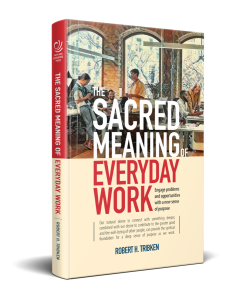
I am happy to say that after lots of research, discussion, writing, and editing, The Sacred Meaning of Everyday Work is now available on Amazon. Thank you to everyone who has provided advice and insight over the years.
The book covers a range of topics, but the overall theme is that your own faith or spirituality can help you find the deeper meaning and purpose in your work life. It offers insights for the reader’s consideration from the Bible, contemporary research (especially positive psychology and organizational behavior), and business experience.
The theme is extended into practical topics like how we might deal with work-related problems like sin, failure, stress, burnout, and conflict. It goes on to discuss the development of character strengths, short spiritual practices that can be integrated into our work day, and the spiritual dimension of leadership.
A summary of the chapters is below and more information is available here. The book is available on Amazon.
I look forward to any comments you might have.
Summary of Chapters:
Chapter One looks at human purpose and potential from the perspective of the two great biblical creation stories. The Bible suggests we have a deep, mysterious connection with God and expresses this in several ways: we are made in the image of God, God breathed his spirit into us, and we were each created for a purpose. Each individual, therefore, has inherent value and dignity no matter their station in life.
We each have the right to act on our own volition and understanding, free from oppression. We are designed to enjoy creating and producing as we contribute to the greater good. These are essential aspects of our nature as humans and have profound implications for the meaning we find in our work.
Chapter Two explores the implications for human flourishing using the biblical concept of shalom as a starting point and then incorporates insights from contemporary resources, such as positive organizational psychology, to support and deepen our understanding.
Shalom originally meant flourishing in all dimensions of life, including our work lives. As such, it provides ways to think about the meaning of our work and working relationships and how these connect with our faith or spirituality.
It takes a great many jobs and tasks for a modern society to flourish; shalom can help us appreciate these diverse and often unrecognized contributions.
Chapter Three discusses sin. As we talk about the potential goodness of work, many of us will recognize that our work lives do not reflect this high view, at least not on the surface. Sin is one of the things that spoil our work, distract us from our deeper purpose, and get in the way of shalom and flourishing. The chapter draws lessons from several examples and discusses the dynamics of confession, forgiveness, and reconciliation as they apply to our work.
Chapter Four discusses other things that get in the way of flourishing and fulfilling our deeper purpose, such as adversity and various misfortunes. We discuss four that are especially important in our work lives: failure, work-related stress, burnout, and interpersonal conflict. The book seeks solutions in biblical insights, psychological research, and personal experience.
Chapter Five discusses cultivating character strengths that help us overcome sin and adversity, pursue our deeper purpose, contribute to shalom, and develop productive, collaborative working relationships. It focuses on seven that are especially important in our work lives: integrity, courage, compassion, hope, humility, resilience, and prudence. Cultivating these strengths open us to a life of spiritual depth and helps us work with greater purpose.
Chapter Six focuses on short spiritual practices involving various forms of prayer that can support and be integrated into the rhythms of our work. These practices help us turn our attention toward God as we go through the workday, connect with our deeper purpose, refocus our attention, and cultivate an enterprising spirit.
Chapter Seven explores whether our work can be our calling, with all this means for the purpose and fulfillment we find in it. The book explores the topic from both secular and religious perspectives and offers suggestions for how we might develop a sense of calling over time.
Chapter Eight explores the spiritual dimension of leadership. It notes the difference between managers and leaders and the need both have for a clear sense of purpose. It discusses some of the temptations of leadership, such as narcissism, and includes a discussion of what the “shalomic organization” might look like.
The appendices include a more in-depth discussion of work in the Bible, a discussion of ongoing changes in the nature of work, an examination of the state of flow and whether or not it has a spiritual connection, and some thoughts about the opportunity for churches to meet the spiritual needs of people in the workplace.
Back Matter: The book includes an extensive bibliography that can be used as a reference source and both Scripture and Name/Subject indexes.

